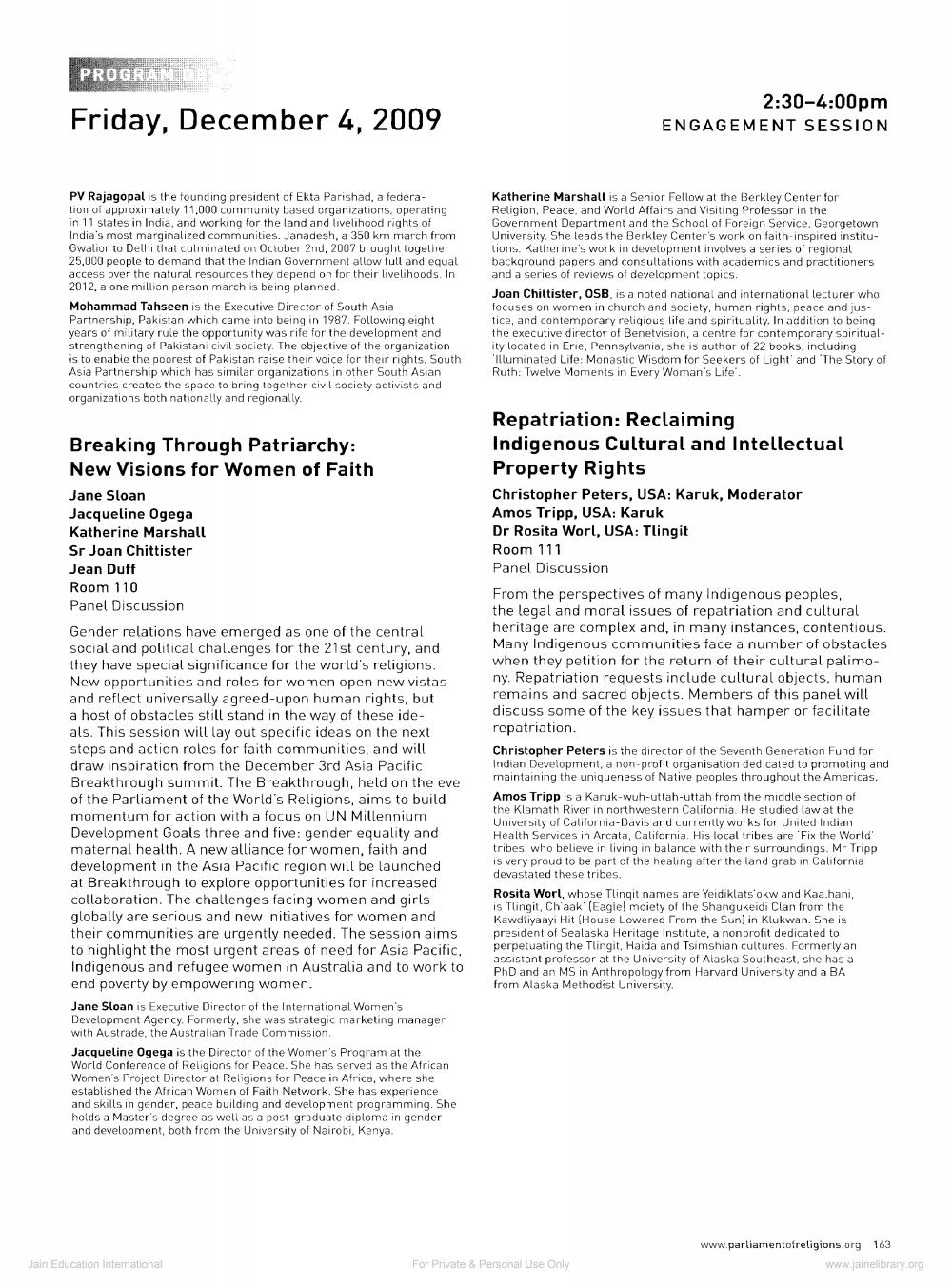________________
PROGRAM D:
Friday, December 4, 2009
PV Rajagopal is the founding president of Ekta Parishad, a federation of approximately 11,000 community based organizations, operating in 11 states in India, and working for the land and livelihood rights of India's most marginalized communities. Janadesh, a 350 km march from Gwalior to Delhi that culminated on October 2nd, 2007 brought together 25,000 people to demand that the Indian Government allow full and equal access over the natural resources they depend on for their livelihoods. In 2012, a one million person march is being planned.
Mohammad Tahseen is the Executive Director of South Asia Partnership, Pakistan which came into being in 1987. Following eight years of military rule the opportunity was rife for the development and strengthening of Pakistani civil society. The objective of the organization is to enable the poorest of Pakistan raise their voice for their rights. South Asia Partnership which has similar organizations in other South Asian countries creates the space to bring together civil society activists and organizations both nationally and regionally.
Breaking Through Patriarchy:
New Visions for Women of Faith
Jane Sloan
Jacqueline Ogega
Katherine Marshall
Sr Joan Chittister
Jean Duff
Room 110
Panel Discussion
Gender relations have emerged as one of the central social and political challenges for the 21st century, and they have special significance for the world's religions. New opportunities and roles for women open new vistas and reflect universally agreed-upon human rights, but a host of obstacles still stand in the way of these ideals. This session will lay out specific ideas on the next steps and action roles for faith communities, and will draw inspiration from the December 3rd Asia Pacific Breakthrough summit. The Breakthrough, held on the eve of the Parliament of the World's Religions, aims to build momentum for action with a focus on UN Millennium Development Goals three and five: gender equality and maternal health. A new alliance for women, faith and development in the Asia Pacific region will be launched at Breakthrough to explore opportunities for increased collaboration. The challenges facing women and girls globally are serious and new initiatives for women and their communities are urgently needed. The session aims to highlight the most urgent areas of need for Asia Pacific, Indigenous and refugee women in Australia and to work to end poverty by empowering women.
Jane Sloan is Executive Director of the International Women's Development Agency. Formerly, she was strategic marketing manager with Austrade, the Australian Trade Commission.
Jacqueline Ogega is the Director of the Women's Program at the World Conference of Religions for Peace. She has served as the African Women's Project Director at Religions for Peace in Africa, where she established the African Women of Faith Network. She has experience and skills in gender, peace building and development programming. She holds a Master's degree as well as a post-graduate diploma in gender and development, both from the University of Nairobi, Kenya.
Jain Education International
2:30-4:00pm
ENGAGEMENT SESSION
Katherine Marshall is a Senior Fellow at the Berkley Center for Religion, Peace, and World Affairs and Visiting Professor in the Government Department and the School of Foreign Service, Georgetown University. She leads the Berkley Center's work on faith-inspired institutions. Katherine's work in development involves a series of regional background papers and consultations with academics and practitioners and a series of reviews of development topics.
Joan Chittister, OSB, is a noted national and international lecturer who focuses on women in church and society, human rights, peace and justice, and contemporary religious life and spirituality. In addition to being the executive director of Benetvision, a centre for contemporary spirituality located in Erie, Pennsylvania, she is author of 22 books, including Illuminated Life: Monastic Wisdom for Seekers of Light' and 'The Story of Ruth: Twelve Moments in Every Woman's Life.
Repatriation: Reclaiming
Indigenous Cultural and Intellectual
Property Rights
Christopher Peters, USA: Karuk, Moderator
Amos Tripp, USA: Karuk
Dr Rosita Worl, USA: Tlingit Room 111
Panel Discussion
From the perspectives of many Indigenous peoples, the legal and moral issues of repatriation and cultural heritage are complex and, in many instances, contentious. Many Indigenous communities face a number of obstacles when they petition for the return of their cultural palimony. Repatriation requests include cultural objects, human remains and sacred objects. Members of this panel will discuss some of the key issues that hamper or facilitate repatriation.
Christopher Peters is the director of the Seventh Generation Fund for Indian Development, a non-profit organisation dedicated to promoting and maintaining the uniqueness of Native peoples throughout the Americas. Amos Tripp is a Karuk-wuh-uttah-uttah from the middle section of the Klamath River in northwestern California. He studied law at the University of California-Davis and currently works for United Indian Health Services in Arcata, California. His local tribes are 'Fix the World' tribes, who believe in living in balance with their surroundings. Mr Tripp is very proud to be part of the healing after the land grab in California devastated these tribes.
Rosita Worl, whose Tlingit names are Yeidiklats'okw and Kaa.hani, is Tlingit, Ch'aak (Eaglel moiety of the Shangukeidi Clan from the Kawdliyaayi Hit (House Lowered From the Sun) in Klukwan. She is president of Sealaska Heritage Institute, a nonprofit dedicated to perpetuating the Tlingit, Haida and Tsimshian cultures. Formerly an assistant professor at the University of Alaska Southeast, she has a PhD and an MS in Anthropology from Harvard University and a BA from Alaska Methodist University.
For Private & Personal Use Only
www.parliamentofreligions.org 163 www.jainelibrary.org




